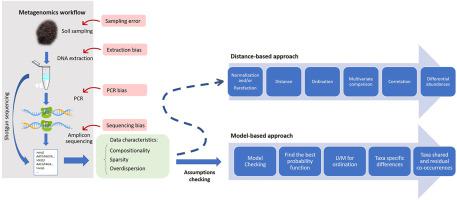Soil Biology and Biochemistry ( IF 9.8 ) Pub Date : 2020-10-07 , DOI: 10.1016/j.soilbio.2020.108042 Márcio F.A. Leite , Eiko E. Kuramae

|
Soil microbial community data produced by next-generation sequencing platforms has introduced a new era in microbial ecology studies but poses a challenge for data analysis: huge tables with highly sparse data combined with methodological limitations leading to biased analyses. Methodological studies have attempted to improve data interpretation via data transformation and/or rarefaction but usually neglect the assumptions required for an appropriate analysis. Advances in both mathematics and computation are now making model-based approaches feasible, especially latent variable modeling (LVM). LVM is a cornerstone of modern unsupervised learning that permits the evaluation of evolutionary, temporal, and count structure in a unified approach that directly incorporates the data distribution. Despite these advantages, LVM is rarely applied in data analyses of the soil microbiome. Here, we review available methods to handle the characteristics of soil microbial data obtained from next-generation sequencing and advocate for model-based approaches. We focus on the importance of assumption checking for guiding the selection of the most appropriate method of data analysis. We also provide future directions by advocating for the consideration of the dataset produced by sequencing as a representation of microbial detections instead of abundances and for the adoption of hierarchical models to convert these detections into estimated abundances prior to evaluating the microbial community. In summary, we show that model assessment is important for qualifying interpretations and can further guide refinements in subsequent analyses. We have only begun to understand the factors regulating soil microbial communities and the impacts of this microbiota on the environment/ecosystem. Understanding the assumptions of new methods is essential to fully harness their power to test hypotheses using high-throughput sequencing data.
中文翻译:

您必须选择,但要明智地选择:用于微生物群落分析的基于模型的方法
下一代测序平台产生的土壤微生物群落数据为微生物生态学研究开辟了一个新时代,但对数据分析提出了挑战:巨大的表,稀疏的数据以及方法学上的局限性导致分析偏颇。方法学研究试图通过数据转换和/或稀疏性来改善数据解释,但通常忽略了进行适当分析所需的假设。现在,数学和计算技术的进步都使基于模型的方法变得可行,尤其是潜在变量建模(LVM)。LVM是现代无监督学习的基石,它允许以直接合并数据分布的统一方法评估进化,时间和计数结构。尽管有这些优势,LVM很少用于土壤微生物组的数据分析。在这里,我们回顾了可利用的方法来处理从下一代测序获得的土壤微生物数据的特征,并倡导基于模型的方法。我们将重点放在假设检查对指导选择最合适的数据分析方法的重要性上。我们还提倡通过考虑将测序产生的数据集视为微生物检测而不是丰度的方法,并在评估微生物群落之前采用层次模型将这些检测转换为估计的丰度来提供未来的方向。总而言之,我们表明模型评估对于合格的解释很重要,并且可以在后续分析中进一步指导改进。我们才刚刚开始理解调节土壤微生物群落的因素以及该微生物群对环境/生态系统的影响。了解新方法的假设对于充分利用其使用高通量测序数据检验假设的能力至关重要。











































 京公网安备 11010802027423号
京公网安备 11010802027423号